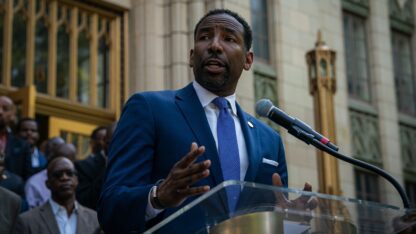Deal Signs Bill Renewing Tax Exemption For Food Banks

Governor Nathan Deal signed a bill to give sales tax exemptions to food banks, a measure he vetoed just last year.As heard on the radio
The exemption, which was lumped into a larger tax exemption bill the governor signed into law Monday at the Atlanta Community Food Bank, reinstates a sales tax exemption for food banks that had expired two years ago.
“What this means is hundreds of thousands of dollars that we can use to purchase food for families for families and children across the state,” said Bill Bolling, who heads the Atlanta Community Food Bank.
But Bolling isn’t sure why the state’s seven Food Banks lost the tax exemption in the first place.
An effort to reinstate the exclusion passed the general assembly with near unanimous support last year, but in a surprising move Deal vetoed it.
At the time, he said the measure needed to be vetted by his Competitiveness Initiative panel, despite signing other tax breaks that hadn’t gone through the panel.
“The 2010 Special Council on Tax Reform and Fairness for Georgians recommended ‘that all nongovernment and nonbusiness input exemptions sunset so that the Legislature may determine if economic or non-economic justifications exist for renewing these exemptions,’” Deal said in a statement when he vetoed the measure. “In following their recommendation, I will request the Governor’s Competitiveness Initiative taskforce to review this bill and provide an opinion on whether economic or noneconomic justifications exist for the exemptions to be renewed during the next legislative session.”
Deal spokesperson Brian Robinson said because the food bank exemption wasn’t current at the time, it needed the panel’s approval.
“He supports the tax credit, but he had said he wanted this system followed,” Robinson said. “He wanted us to have a more reliable and rational approach to giving tax exemptions.”
The Competitiveness Panel this year named the food bank exemption one of two immediate concerns.
The Georgia Budget and Policy Institute estimates the exemption will cost about $1.5 million over two years.
9(MDAxODM0MDY4MDEyMTY4NDA3MzI3YjkzMw004))








